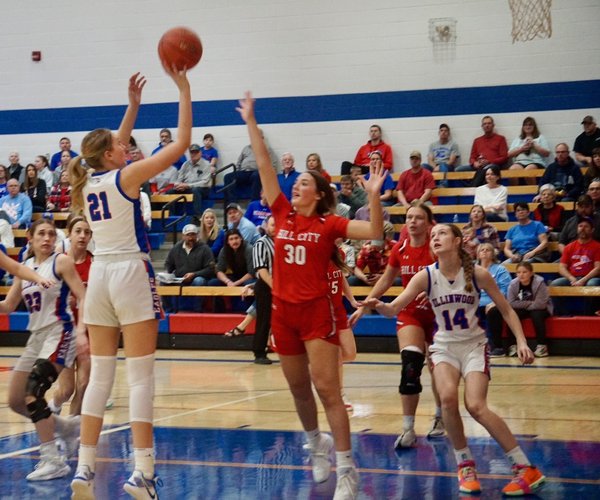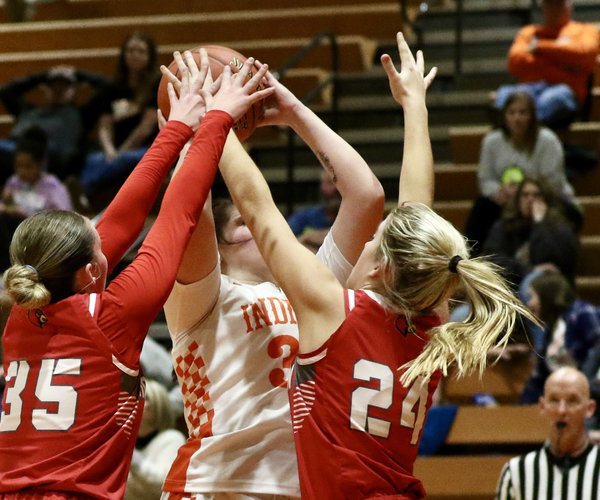Ryan's Hope
Former Oiler seeks to help others
BY JIM MISUNAS
jmisunas@gbtribune.com
AMES, Iowa — Former Central Plains all-stater Emily Ryan is the consummate basketball teammate. Ryan's Oilers finished unbeaten (104-0) in four seasons, thanks to her precise passing skills.
Ryan owns high school state records for career steals (599), career field goals (73.8%) and career free throws (95.0%).
The pass-happy Ryan owns the all-time assist record for perennial NCAA qualifier Iowa State.
However, Ryan's legendary work ethic led to her Achilles' Heel when she developed an eating disorder that became life threatening.
She unveiled her illness during a YouTube video.
"By sharing my story, I hope to build awareness and provide hope to everyone else fighting an invisible battle," Ryan said.
"The eating disorder was in control of my life and I didn't realize it. I wasn't able to eat enough to keep up with the demands of my sport."
Her pursuit of excellence proved to be a double-edged sword.
"I've dedicated my life to be the best basketball player I could be," she said. "If I wasn't performing at a high-enough level, I felt guilty for letting other people down. This created an obsession to do everything I could to improve because my sense of self worth was dependent on team success and my performance.
"I spent countless hours refusing to let anyone outwork me. I had to find ways to get an edge. I worked ways to improve my body and athleticism. I focused on my diet. Initially, it worked. The team won games and I played better. But my new habits begin to catch up with me. My body couldn't sustain the demands I was placing on it."
Iowa State's medical support staffers expressed concern about Ryan's health and well being last season.
Ryan set aside their concerns, thinking she was trying to become the best athlete she could be.
"My senior year when I needed to be my best, my body was shutting down," she recalled. "I was told I had an eating disorder. I didn't fit the mold of someone who had an eating disorder. In my mind, there was no way something like that could happen to me. I was in complete denial. I convinced myself I wasn't sick."
Ryan had started 92 of 94 games at Iowa State before sitting out the first nine games in 2023-2024.
"I was pulled away from basketball one month before our first game when my health got worse," she said. "I felt guilty for letting it get to this point and letting my teammates and coaches down."
The break worked on the court.
"When the season started, I played at a high level. Off the court, I was struggling," she said. "At the end of the season, I was physically and mentally hanging on by a thread. I barely had enough energy to play and practice. But I had to find the strength to smile because I couldn't let everyone see I was struggling. I acted like nothing was wrong."
When the 2023-2024 basketball season ended, Ryan's health nightmare became a reality. She received intensive care and health re-education for 88 days during the off-season at an eating disorder facility in Denver, Colo.
"We knew something had to change. We dedicated the offseason to high level care. It was the hardest thing I've done," she said.
The treatment was split between wiser dietary choices, and an understanding that her condition required assistance.
"It took a long time, but I came to the understanding that being sick wasn't my fault," she said. "Eating disorders are real complex illnesses. Eating disorders don't discriminate and no one is immune.
"I was able to leave treatment with the new belief that my value as a person is greater than what I do on the basketball court."
Ryan learned that valuing mental health is invaluable.
"Mental health is so important and can be as disabling as a physical injury," she said. "Healing from a mental illness isn't something that can be done alone. It requires support from others. Asking for help is not a sign of weakness but of strength.
"A mental illness is not mental weakness. I look forward to the journey of healing from my eating disorder. The endless support from teammates, coaches and Cyclone Nation has been appreciated as I've dealt with adversity off the court.
"My goal is to emphasize the importance that athletes see themselves as real people, people who are special for the person they are and not what they accomplish."
The National Eating Disorders Helpline is 800-931-2237; or text NEDA to 741741
Ryan's Hope
Former Oiler seeks to help others





